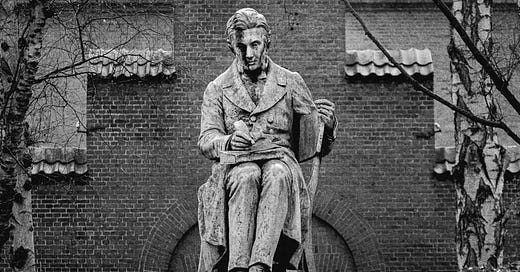Søren Kierkegaard was a Danish philosopher who was known for his serious and philosophical musings on life, faith, and the human condition. But let's be real, sometimes all that deep thinking can be a bit, well, heavy. So let's lighten things up a bit and get to know Kierkegaard's philosophy!
First of all, let's talk about Kierkegaard's famous concept of "the leap of faith." Now, we've all taken leaps of faith before - like the time I jumped off the diving board at the pool even though I was scared out of my mind (it didn't end well, but hey, at least I tried). But for Kierkegaard, the leap of faith was a bit more metaphorical. He believed that faith was something that couldn't be proven or demonstrated through reason or evidence, and that it required a personal commitment and subjective experience. In other words, it was like jumping off the metaphorical diving board of doubt and into the pool of belief. And let's be real, sometimes that pool can be pretty shallow (like when your friend tells you they have a surefire way to earn quick money and it turns out to be a total scam). But other times, that pool can be deep and fulfilling (like when you finally convince your friends to trust you while driving and it turns out to be a huge hit - not crash). So, in the end, it's all about taking the leap and hoping for the best (or at least not belly-flopping into the shallow end).
Now let's talk about Kierkegaard's concept of authenticity. In his view, it was important for individuals to be true to themselves and to express their unique subjectivity in order to find meaning and fulfillment in life. But let's be real, sometimes being authentic can be tough. I mean, have you ever tried to be yourself in front of your boss or a group of strangers? It can be scary! But Kierkegaard would probably say that it's worth it in the end. After all, who wants to go through life pretending to be someone they're not? That's like wearing shoes that are too small - uncomfortable and painful. So let's embrace our quirks and weirdness and be true to ourselves, no matter how scary it might seem.
Finally, let's talk about Kierkegaard's concept of the dichotomy between aesthetic and ethical living. In "Either/Or," Kierkegaard argues that individuals have a choice between living an aesthetic life, which is focused on pleasure and enjoyment, and an ethical life, which is focused on moral responsibility and duty. Now, I don't know about you, but I've definitely had my fair share of both aesthetic and ethical moments. Like the time I ate an entire 20-inch pizza in one sitting (aesthetic) and the time I spent hours volunteering at a soup kitchen (ethical). But Kierkegaard would probably say that it's important to strike a balance between the two. After all, who wants to live a life that's all work and no play (ethical) or all play and no work (aesthetic)? That's like having a party with no music (boring) or a dance party with no alcohol (boring). So let's try to find a balance between aesthetic and ethical living and make the most of this crazy thing called life!
So there you have it. Explore the importance of faith, the individual, and authenticity in human life. His ideas continue to be relevant today and his work challenges us to think deeply about the role of faith in our lives and to embrace the complexities of the human experience. It also encourages us to live authentic lives and to be true to ourselves. So raise a glass (or a newly founded cocktail) to Kierkegaard and his enduring philosophical contributions!




